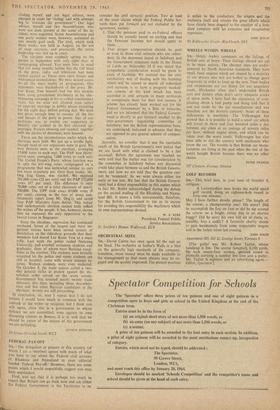SIR,—The delegation at present in this country (of which I
am a member) agrees with much of what you have to say about the Federal civil servants of Rhodesia and Nyasaland in your editorial headed 'Federal Pay-off.' However, there arc sonic points which I would respectfully suggest you may have overlooked.
First, you say that it is perhaps too much to expect that Britain can go back now and ask either the Federal Government or the Territories to re- consider the civil servants' position. Two at least of the main claims which the Federal Public Ser- vants have put forward arc not excluded by the agreement, namely: 1. That -the pensions paid to ex-Federal officers should be soundly based on sterling and that the Pensions Increase Act should apply to them.
2. That proper compensation should he paid at least to those civil servants who are redun- dant. In the statement issued in Salisbury and the Government statement made in the House of Lords on November 14 it was stated that sympathetic consideration would be given to cases of hardship. We contend that the only satisfactory way of dealing with the hardship which will be caused to nearly all redundant civil servants is to have a properly worked- out scheme ' of the kind which has been accorded to civil servants in many territories to compensate them for their lost careers. A scheme has already been worked out for the Federal Government by a firm of actuaries, and we are informed that the Federal Govern- ment is shortly to put forward another to the inter-government negotiating committee in Salisbury; but the British representatives have, we understand, indicated in advance that they are opposed to any general scheme of compen- sation.
Secondly, we consider that it was the inevitable result of the British Government's own policy that we are faced with what is claimed to be a fait accompli. Before the agreement was reached we were told that the matter was for consideration by the committee in Salisbury before any discussion could take place between us and the British Govern- ment, and now we are told that the question can- not be 'reopened.' So we were always either too early or too late. We feel that the British Govern- ment had a direct responsibility in this matter which in fact Mr. Butler acknowledged during the debate on the second reading of the Rhodesia and Nyasa- land Bill. It seems a little unreasonable, therefore, for the British Government to use as its excuse for avoiding this responsibility the machinery which its own representatives devised.






























































 Previous page
Previous page